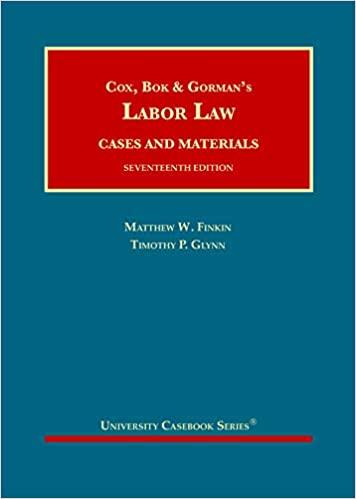Question
* To determine in court whether there was an ' intention to create legal relations ' between negotiating parties the court has to decide what
* To determine in court whether there was an 'intention to create legal relations' between negotiating
parties the court has to decide what the actualintention of the parties was, a subjectivetest
* The court will make a rebuttable presumption that in social or family arrangements there is
always anintention to create legal relations
* Unlike the position in Civil Law Countries there must be considerationpresent if an agreement is to
legally enforceable in a Common Law country
* Law in Common Law countries developed mainly from written Roman Law established when
the Roman Empire ruled the land around the Mediterranean Sea.
* Separation of powers involves government, Parliament, and the judiciary whereby power is
distributed between all three entities to avoid too much power to be held by any one of them,
essentially to avoid excessive State control over citizens
* In New Zealand a draft Act of Parliament is a Billwhich passes through various stages of discussion
and it becomes law when signed by the British Queen's representative in NZ, the solicitor-general
* No building contact is legally enforceable unless it is written
* Terms of a contract can be made expressly or impliedly
* If an agreement has been entered into in writing and both parties signed the agreement but one
party did not willingly sign the agreement, the agreement is unenforceable
* It does not necessarily follow that if one party to an agreement has used its economic position to
persuade the other party to agree to less than ideal terms, that the agreement is unenforceable
* If a party is in breach of a contract by not doing what the party agreed to do under the contract, then
unless that party can correct the breach, that party is liable to pay the other party damages being
being money to compensate them for the harm or loss caused by that breach
* If an agreement is made between two parties in which one party will pay money for the other party's
performance of its obligations, it must be a legally enforceable contract
* The element of "consideration" in a contract means that the parties have thought about it and have
consideredtheir intentions under the agreement
* Capacity to contractconcerns a party's mental ability to be able to know what they are doing when
making a contract for example by reason of age or mental state, either permanent or temporary, so
is not possible to make a legally binding contract after taking drugs
* A deed is an agreement made in a specific form which, unlike a contract, can create legally
binding obligations without the presence of consideration
* The need for considerationto form a legally binding contract is a creation of the Common Law
system but is not a requirement of the Civil Law system
* Under the 'postal rule' an offeris acceptedwhen the letter of acceptanceis committed to the postal
system is beforethe offeror received the letter of acceptance, or even saw it
* Even if a Court considers the parties real intentionwas to enter into a binding agreement, unless the
agreement is 100% certain on every point it will not enforce it as a contract
* If agreements are made in a business setting there is a rebuttable presumption by the Court that
there was an intention to create legal relations
* A legally binding contract cannot be made by A promising to do something for B in exchange for a
promise by B to do something for A, because there must always be consideration
* Certain elements are common to all contracts but a lot of contracts by reason of frequent and
repetitive use develop specific features, and specific legislationcovers construction contracts
* A builder agreed to make extensive renovations and structural alterations to a homeowner's house
and they both agreed not to apply to the consenting authorityfor a building consent as it was unlikely
that one would be given; this was still a legally binding contract if a price for the work had been
agreed because parties are free to enter into anyagreement for anyprice they agree to
* A misrepresentationis an untrue statement of a future fact for the purposes of s35 of theContract
and Commercial Law Act 2017e.g. a statement was made to help sell agricultural land that it
would produce a specific quantity of corn per acre next year which it failed to do
* If a misrepresentationis made by A to B about A's house being constructed entirely from treated
timber which B believes and buys A's house in reliance on that advice but later discovers the
timber is all untreated when the house leaks and rots, because there was no consensus ad idem
i.e. agreement on what was being bought and sold, there was no binding contract, so B cannot
sue A because there was no contract to sue on and B is stuck with the house as it is
* If someone is persuaded to enter into a contract by a misrepresentationmade by the other party
then s/he has 2 options under the Contract and Commercial Law Act 2017being to either keep the
contract alive and claim damagesor, cancel the contract but lose an entitlement to damages
- Please judge whether these are true or false
- This is about New Zealand law
Step by Step Solution
There are 3 Steps involved in it
Step: 1

Get Instant Access to Expert-Tailored Solutions
See step-by-step solutions with expert insights and AI powered tools for academic success
Step: 2

Step: 3

Ace Your Homework with AI
Get the answers you need in no time with our AI-driven, step-by-step assistance
Get Started


